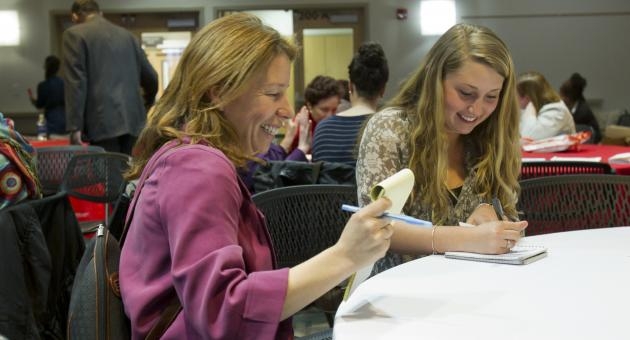Speed-dating event matches Temple faculty with local non-profits

Last month Temple entered the business of match-making.
But instead of facilitating 'love connections,' Temple's Community Learning Network (CLN) set out to introduce faculty to community organizations for the purpose of fostering community work, academic interests and research projects.
Approximately 15 faculty members got together with 15 community organizations, including Philabundance, South Kensington Community Partners and Friends Rehabilitation Program, at CLN's "Speed dating with Community Partners," held March 30.
CLN fosters civic engagement in learning and research at Temple and serves as a central resource for local community groups seeking partnerships with Temple's academic programs. In addition to maintaining mutually beneficial relationships between community organizations and Temple students and faculty, CLN supports the development of specially designated "Community-Based Learning" courses. Approximately 1,000 students serve the community through these courses each semester.
The CLN model is a departure from the "service-learning model." Popular in the 1990s, service-learning emphasized student service in communities, yet often without developing equal and sustainable partnerships.
"Our emphasis is on reciprocity," said CLN Director Carol Harris Shapiro. "Our goal is to support study and work that bring advantages to both university and community partners.
Bess Wellbourne Yates, an instructor in Temple's Department of Landscape Architecture and Horticulture, partners with several non-profit organizations — including the Pennsylvania Horticulture Society, Fairmount Park and Bartram's Gardens — to provide the students in her Green vs. Gray: Urban Ecology class with opportunities to link classroom concepts with real life activities.
"Without these community partnerships, my students would probably never get the experience of clearing out a vacant lot or wrapping a tree to protect it from deer. These experiences give them first-hand knowledge of how to take responsibility for our urban environment," she said.
David Chiles, senior manager of volunteers at Philabundance, the region's largest food bank and hunger relief organization, had "a lot of terrific conversations" at the speed-dating event.
"I am excited about the idea of partnering with faculty members on projects whereby Philabundance can benefit from the expertise and knowledge that faculty bring to the table," he said.
At the event, CLN Assistant Director Rachel Howe connected Chiles with Alice Hausman of Temple's Department of Public Health. The pair brainstormed about working together on a grant application for a project which will promote health and nutrition literacy in Philadelphia neighborhoods.
"The project could potentially involve the development of community-based learning courses whereby students could get experience doing tutoring and/or needs-based mapping in the community as part of a real research project," said Howe.
Julia Mendenhall, assistant professor of English, is currently revising her First-Year Writing course to have students explore the history of AIDS in Philadelphia. Through the speed dating event, Mendenhall met representatives of organizations in Philadelphia that will allow her to incorporate hands-on experience with local non-profits that work on AIDS into her course.
According to Mendenhall, working with non-profits trains and professionalizes students, and gives them vital skills that college students really want and need.
"Students want to experience Philadelphia in all of its glory, and community-based learning gives students a variety of ways of being active learners, to connect meaningfully with this city and become future global citizen/leaders, not merely passive, sequestered educational consumers," Mendenhall said.
"Students also tell me they are here to give back to Philly, a place they've come to love."